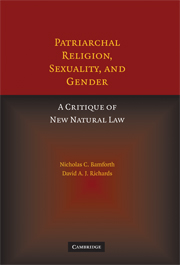Book contents
- Frontmatter
- Contents
- Acknowledgments
- 1 New Natural Law in Context
- 2 Criteria for Evaluating New Natural Law
- 3 The Architecture and Reach of New Natural Law
- 4 Internal Consistency (1): Is New Natural Law Secular?
- 5 Internal Consistency (2): New Natural Law and Thomas Aquinas
- 6 Substantive Appeal (1): What's Wrong with Homophobia and Sexism?
- 7 Substantive Appeal (2): New Natural Law, Sexism, and Homophobia
- 8 Moral Absolutes and the Possible Fundamentalism of New Natural Law
- 9 New Natural Law and Patriarchal Religion
- 10 Concluding Observasions, and Christian Alternatives to New Natural Law
- Bibliography
- Index
8 - Moral Absolutes and the Possible Fundamentalism of New Natural Law
Published online by Cambridge University Press: 14 August 2009
- Frontmatter
- Contents
- Acknowledgments
- 1 New Natural Law in Context
- 2 Criteria for Evaluating New Natural Law
- 3 The Architecture and Reach of New Natural Law
- 4 Internal Consistency (1): Is New Natural Law Secular?
- 5 Internal Consistency (2): New Natural Law and Thomas Aquinas
- 6 Substantive Appeal (1): What's Wrong with Homophobia and Sexism?
- 7 Substantive Appeal (2): New Natural Law, Sexism, and Homophobia
- 8 Moral Absolutes and the Possible Fundamentalism of New Natural Law
- 9 New Natural Law and Patriarchal Religion
- 10 Concluding Observasions, and Christian Alternatives to New Natural Law
- Bibliography
- Index
Summary
In the two preceding chapters, we argued that the new natural lawyers' treatment of sexuality and gender is substantively unappealing. In this chapter, we develop the argument on a more general basis by analyzing the new natural lawyers' idea of moral absolutes. Apart from further highlighting the theory's general lack of appeal, this analysis will provide an additional illustration of its religious characteristics, taking forward our argument from Chapter 4. We intend to make two specific arguments. The first is that the new natural lawyers' articulation of a series of moral absolutes makes the theory appear, at first sight, to constitute a Catholic form of fundamentalism. Since fundamentalism is usually viewed as a strain of Protestant thought associated with a belief in the literal truth of the text of – or certain texts within – the Bible, this argument requires us to analyze the idea of fundamentalism in further detail. We suggest that some fundamentalist arguments involve a belief in the literal and absolute truth of a text – the version associated with some forms of Protestantism – but that the term ‘fundamentalist’ can also be applied to any absolutist doctrinal argument that operates according to an internal logic but with little or no connection to the day-to-day morally relevant realities of the world. It is in this second sense that the moral absolutes might at first sight be categorized as fundamentalist.
- Type
- Chapter
- Information
- Patriarchal Religion, Sexuality, and GenderA Critique of New Natural Law, pp. 279 - 303Publisher: Cambridge University PressPrint publication year: 2007



